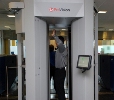
Commercial Pilot Barred After Refusing Full-Body Scan
A pilot was denied from passing through security at Memphis International Airport Oct. 15 after he refused to submit to a full-body scan or a manual pat down.
Michael Roberts, a pilot for Houston-based ExpressJet Airlines, left the airport after Transportation Security Administration officials asked him to leave.
Roberts recounted his experience on The Pipe, a forum for aviation professionals. He said as he was passing through security on his way to work, he was asked to pass through an advanced imaging technology (AIT) unit, which screens passengers for metallic and non-metallic threats—including weapons, explosives and other objects concealed under layers of clothing. Roberts told TSA officers that he did not to go through the AIT unit because he thought it was invasive.
In his post on The Pipe, Roberts said, “These devices enable screeners to see beneath people’s clothing to an extremely graphic and intrusive level of detail (virtual strip searching).”
After refusing, Roberts said he was told he would have to go through a secondary screening, which would involve a TSA officer frisking him. Roberts declined. Since he could not enter the terminal, Roberts was told he could go home. He was detained before leaving and was questioned by TSA officials and airport security.
TSA began deploying advanced imaging technology in 2007. Currently, there are 259 imaging technology units at 58 airports.
“Deploying advanced imaging technology at these airports strengthens our ability to protect the traveling public in the face of evolving threats to aviation security,” said Department of Homeland Security Secretary Janet Napolitano. “Through the Recovery Act, we are able to continue our accelerated deployment of enhanced technology as part of our layered approach to security at airports nationwide.”
TSA said it ensures passenger privacy through the anonymity of AIT images—a privacy filter is applied to blur all images; in the operational mode images are permanently deleted immediately once viewed and are never stored, transmitted or printed; and the officer viewing the image is stationed in a remote location so as not to come into contact with passengers being screened.
After leaving the airport and arriving home, Roberts learned that TSA had contacted his supervisor in Houston about the incident. “Shortly after I got home, my boss called and said they had been contacted by the TSA,” Roberts said. “I suppose my employment status at this point can best be described as on hold.”
A USA Today/Gallup poll found that 78 percent of air travelers approve of U.S. airports’ using AIT units. The poll was conducted Jan. 5-6, 2010, using interviews from 542 air travelers.